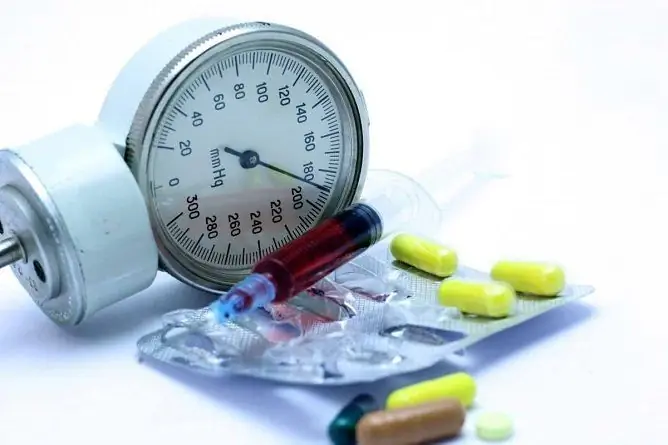- Author Rachel Wainwright wainwright@abchealthonline.com.
- Public 2023-12-15 07:39.
- Last modified 2025-11-02 20:14.
Low progesterone: causes and symptoms of low progesterone in women
The content of the article:
-
Causes of low progesterone in women
- Luteal phase failure
- Thyroid dysfunction
- Dysfunctions of the hypothalamus and pituitary gland
- Placental insufficiency
- Hyperandrogenemia
- Hyperprolactinemia
- Symptoms of low progesterone in women
- Diagnostics of the lowered progesterone
- How to raise low progesterone
Low progesterone is manifested by increased fatigue, menstrual irregularities, infertility. For the appointment of adequate treatment, it is required to identify the reasons for the deviation. It is especially important to control the level of the hormone during in vitro fertilization.
Progesterone is one of the most important female sex hormones and has a steroid structure. It has a significant impact on the menstrual cycle, pregnancy and embryonic development of the fetus. In addition, it takes part in the formation of other steroid hormones (testosterone, cortisol), as well as in the regulation of the functions of the central nervous system as a neurosteroid. Although it is called a pregnancy hormone, it is also present in small amounts in a man's body. According to statistics, one of the main causes of infertility or spontaneous abortion is low progesterone.
Causes of low progesterone in women
The level of progesterone in the female body is not constant; it changes depending on the phase of the menstrual cycle. In the follicular phase, the concentration is low, after ovulation, at the site of the bursting follicle, a gland of temporary secretion is formed, which is called the corpus luteum. She secretes the hormone in large quantities, as a result, its concentration increases. If pregnancy has not occurred, then after 10-12 days the corpus luteum undergoes regression, the secretion of progesterone decreases sharply, which contributes to the onset of menstrual bleeding. With the onset of pregnancy, the corpus luteum performs its functions until the 15-16th week of gestation, after which progesterone begins to be synthesized by the formed placenta.

Progesterone production depends on the phase of the menstrual cycle
The only physiological cause of low progesterone is the postmenopausal state. During this period, a woman's ovaries stop producing eggs, so the corpus luteum is no longer formed in them, and the adrenal glands alone are not able to provide the proper concentration of this hormone.
Pathological causes of low progesterone are:
- dysfunction of the hypothalamus and pituitary gland;
- dysfunction of the thyroid gland;
- insufficiency of the luteal phase;
- placental insufficiency (in pregnant women);
- hyperandrogenemia (increased levels of male sex hormones);
- hyperprolactinemia (increased blood levels of prolactin).
Luteal phase failure
The cause of the lowered progesterone in the luteal phase is usually the pathology of the ovaries.
- Polycystic ovary syndrome. Hormonal disturbances lead to the fact that a woman's mature follicle does not rupture and grows into a cyst, that is, ovulation does not occur, and the corpus luteum does not form in the ovary.
- Ovarian hyperinhibition syndrome. It develops against the background of therapy with certain drugs that suppress the gonadotropic functions of the pituitary gland.
- Premature ovarian failure syndrome. Under the influence of unfavorable factors (chemotherapy, radiation, stress), an early menopause can begin. It is said about its occurrence in case of cessation of menstrual function in women under 45 years of age.
Other causes of low progesterone in the luteal phase can be endometritis, endometriosis, uterine polyps, and malignant tumors of the ovaries and uterus.
Thyroid dysfunction
The hormonal background and fertility of a woman are negatively affected by hypothyroidism (insufficient thyroid function). Thyroid hormones synthesize in the liver a special protein that can attach to itself and remove estradiol and testosterone from the body. In cases where the level of this protein is lowered, the concentration of testosterone and estradiol increases, which prevents the onset of ovulation and the formation of the corpus luteum.
Severe hypothyroidism in women is usually accompanied by infertility. If pregnancy does occur, then without timely and adequate treatment, there is a very high risk of spontaneous termination.
Dysfunctions of the hypothalamus and pituitary gland
The activity of all endocrine glands is regulated by the hypothalamus and pituitary gland. Lack of cerebral blood supply, brain tumors in the area of these anatomical structures can lead to a decrease in the synthesis of gonadotropic hormones. One of the pathologies leading to abortion against the background of low progesterone is pituitary dwarfism.
Placental insufficiency
Normally, the placenta begins to actively synthesize progesterone after the 16th week of pregnancy. Premature aging of the placenta, its improper formation or the formation of calcifications in it can lead to the development of placental insufficiency and, accordingly, a lowered content of progesterone.
Hyperandrogenemia
Low progesterone in women may be caused by a tumor of the ovary or adrenal gland secreting testosterone. Against the background of hyperandrogenemia, that is, a high level of male sex hormones, the surface of the ovaries is covered with a dense capsule, which does not allow the mature egg to come out. As a result, the cycles become anovulatory, the formation of the corpus luteum does not occur.
Hyperprolactinemia
Prolactin is one of the pituitary hormones. Its main function is to regulate the growth and development of the mammary glands and stimulate lactation. Normally, a significant increase in prolactin occurs in the postpartum period. At this time, hyperprolactinemia not only stimulates lactation, but also, by suppressing ovulation, protects a woman from the possible onset of a new pregnancy. Thus, postpartum hyperprolactinemia should be considered as an important protective physiological mechanism aimed at preventing premature wear of the female body by frequent childbirth.
The causes of pathological hyperprolactinemia are pituitary tumors and cerebral blood supply disorders. The increased level of prolactin suppresses the secretion of follicle-stimulating and luteinizing hormones by the pituitary gland, as a result, the maturation of the egg is disrupted, and ovulation does not occur. As a consequence, patients have low progesterone.
Factors that increase the risk of lower progesterone levels in women are:
- hypovitaminosis conditions;
- stress;
- heavy physical activity;
- nutritional errors, namely, insufficient content of proteins and fats of animal origin in the diet.
Symptoms of low progesterone in women
The main signs of low progesterone in women are:
- menstrual irregularities;
- infertility;
- spontaneous termination of pregnancy;
- swelling;
- increased fatigue.
Their severity depends on the ratio of estrogen to progesterone, as well as the degree of deficiency of the latter.

Low progesterone during pregnancy is accompanied by the threat of termination
Diagnostics of the lowered progesterone
If the patient has menstrual irregularities, problems with conceiving or carrying a pregnancy, a blood test for progesterone is prescribed. Outside of pregnancy, the test should be taken 6-7 days after ovulation. If a woman has a regular menstrual cycle lasting 28 days, then the 21st day of the cycle will be the optimal time for the study. With a different duration of the menstrual cycle and subject to its regularity, blood for progesterone should be donated 7-8 days before the onset of the expected menstruation. Women with irregular cycles need to track ovulation, which can be done using different methods (basal temperature method, cervical mucus method, rapid ovulation tests, folliculometry).
How to raise low progesterone
In those cases when the patient has low progesterone, at the stage of planning pregnancy, in the second phase of the menstrual cycle, she is prescribed supportive hormonal therapy with progesterone drugs. On the 11-12th day after ovulation, a blood test for the level of hCG is mandatory in order to early diagnosis of pregnancy. If pregnancy has come, then hormonal support continues until 16 weeks of gestation, that is, until the moment when the placenta is fully mature and begins to actively synthesize progesterone. If there is no pregnancy, progesterone preparations are canceled, and after 1-2 days the woman begins menstruation.
With the threat of termination of pregnancy in the early stages, it is also required to take a blood test for progesterone and, if necessary, carry out hormonal support.
It is especially important to determine the level of progesterone during in vitro fertilization (IVF), since it is this hormone that prepares the uterine mucosa for implantation of transferred embryos, creates optimal conditions for their attachment and development.
YouTube video related to the article:

Elena Minkina Doctor anesthesiologist-resuscitator About the author
Education: graduated from the Tashkent State Medical Institute, specializing in general medicine in 1991. Repeatedly passed refresher courses.
Work experience: anesthesiologist-resuscitator of the city maternity complex, resuscitator of the hemodialysis department.
Found a mistake in the text? Select it and press Ctrl + Enter.






